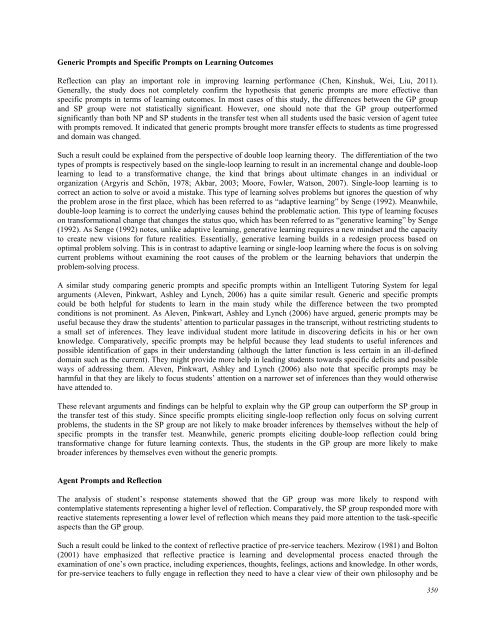January 2012 Volume 15 Number 1 - Educational Technology ...
January 2012 Volume 15 Number 1 - Educational Technology ...
January 2012 Volume 15 Number 1 - Educational Technology ...
Create successful ePaper yourself
Turn your PDF publications into a flip-book with our unique Google optimized e-Paper software.
Generic Prompts and Specific Prompts on Learning Outcomes<br />
Reflection can play an important role in improving learning performance (Chen, Kinshuk, Wei, Liu, 2011).<br />
Generally, the study does not completely confirm the hypothesis that generic prompts are more effective than<br />
specific prompts in terms of learning outcomes. In most cases of this study, the differences between the GP group<br />
and SP group were not statistically significant. However, one should note that the GP group outperformed<br />
significantly than both NP and SP students in the transfer test when all students used the basic version of agent tutee<br />
with prompts removed. It indicated that generic prompts brought more transfer effects to students as time progressed<br />
and domain was changed.<br />
Such a result could be explained from the perspective of double loop learning theory. The differentiation of the two<br />
types of prompts is respectively based on the single-loop learning to result in an incremental change and double-loop<br />
learning to lead to a transformative change, the kind that brings about ultimate changes in an individual or<br />
organization (Argyris and Schön, 1978; Akbar, 2003; Moore, Fowler, Watson, 2007). Single-loop learning is to<br />
correct an action to solve or avoid a mistake. This type of learning solves problems but ignores the question of why<br />
the problem arose in the first place, which has been referred to as “adaptive learning” by Senge (1992). Meanwhile,<br />
double-loop learning is to correct the underlying causes behind the problematic action. This type of learning focuses<br />
on transformational change that changes the status quo, which has been referred to as “generative learning” by Senge<br />
(1992). As Senge (1992) notes, unlike adaptive learning, generative learning requires a new mindset and the capacity<br />
to create new visions for future realities. Essentially, generative learning builds in a redesign process based on<br />
optimal problem solving. This is in contrast to adaptive learning or single-loop learning where the focus is on solving<br />
current problems without examining the root causes of the problem or the learning behaviors that underpin the<br />
problem-solving process.<br />
A similar study comparing generic prompts and specific prompts within an Intelligent Tutoring System for legal<br />
arguments (Aleven, Pinkwart, Ashley and Lynch, 2006) has a quite similar result. Generic and specific prompts<br />
could be both helpful for students to learn in the main study while the difference between the two prompted<br />
conditions is not prominent. As Aleven, Pinkwart, Ashley and Lynch (2006) have argued, generic prompts may be<br />
useful because they draw the students’ attention to particular passages in the transcript, without restricting students to<br />
a small set of inferences. They leave individual student more latitude in discovering deficits in his or her own<br />
knowledge. Comparatively, specific prompts may be helpful because they lead students to useful inferences and<br />
possible identification of gaps in their understanding (although the latter function is less certain in an ill-defined<br />
domain such as the current). They might provide more help in leading students towards specific deficits and possible<br />
ways of addressing them. Aleven, Pinkwart, Ashley and Lynch (2006) also note that specific prompts may be<br />
harmful in that they are likely to focus students’ attention on a narrower set of inferences than they would otherwise<br />
have attended to.<br />
These relevant arguments and findings can be helpful to explain why the GP group can outperform the SP group in<br />
the transfer test of this study. Since specific prompts eliciting single-loop reflection only focus on solving current<br />
problems, the students in the SP group are not likely to make broader inferences by themselves without the help of<br />
specific prompts in the transfer test. Meanwhile, generic prompts eliciting double-loop reflection could bring<br />
transformative change for future learning contexts. Thus, the students in the GP group are more likely to make<br />
broader inferences by themselves even without the generic prompts.<br />
Agent Prompts and Reflection<br />
The analysis of student’s response statements showed that the GP group was more likely to respond with<br />
contemplative statements representing a higher level of reflection. Comparatively, the SP group responded more with<br />
reactive statements representing a lower level of reflection which means they paid more attention to the task-specific<br />
aspects than the GP group.<br />
Such a result could be linked to the context of reflective practice of pre-service teachers. Mezirow (1981) and Bolton<br />
(2001) have emphasized that reflective practice is learning and developmental process enacted through the<br />
examination of one’s own practice, including experiences, thoughts, feelings, actions and knowledge. In other words,<br />
for pre-service teachers to fully engage in reflection they need to have a clear view of their own philosophy and be<br />
350

















